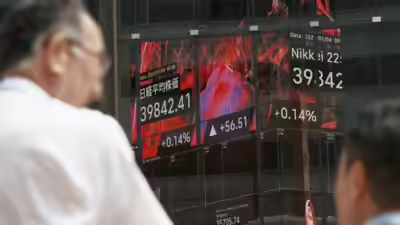Global equity markets retreated following Wall Street record peaks this week as investors became risk-averse in anticipation of a near-term tariff deadline that threatens to heighten global trade tensions. Even as robust U.S. economic data and corporate profits boosted American indexes to record highs, doubt over prospective tariff actions and subdued signals from Asia and Europe tempered global investor confidence.
Wall Street Rally Transcends
The American stock market has had a strong upward trend, with the underpinnings from solid economic indicators such as declining unemployment claims, better consumer confidence, and good corporate earnings across industries. The S&P 500 and Nasdaq closed at record highs at the beginning of this week, led by advances in technology, financial, and energy stocks.
But on Friday, U.S. futures were stretched as investors prepared for the Biden administration to impose new tariffs as part of its response to simmering tensions with China. The potential tariffs, said to focus on industries such as EVs, semiconductors, and solar panels, could prompt retaliatory actions and destabilize investor confidence in global trade stability.
Asian Markets React Cautiously
Asian bourses were the first to show signs of increasing nervousness. Japan’s Nikkei fell slightly after days of increases, while China’s Shanghai Composite was volatile on account of domestic economic issues and geopolitical factors. Asia’s investors are also keeping an eye on the policy cues of China’s People’s Bank as exports slow and consumer spending is subdued in the region’s economy giant.
South Korea’s KOSPI and Hong Kong’s Hang Seng both edged down, with technology and industrial shares retreating in fear of revived trade tensions. Experts say the region is especially at risk of damage from any uptick in U.S.-China tariffs, considering its high degree of integration into global supply chains and manufacturing.
European Sentiment Weakens
European stocks opened lower, with the pan-European STOXX 600 falling more than 0.3% at the opening bell. Germany’s DAX and France’s CAC 40 followed suit as investors considered the double whammy of poor factory output and the ambiguous trade scenario. The euro traded close to a three-week trough against the U.S. currency, indicating caution before possible macroeconomic disturbances.
Inflation concerns continue to linger in some areas of Europe, providing another twist of uncertainty to investors. Meanwhile, while energy prices have levied off, food inflation and wage pressures remain to rile central banks. The next move by the European Central Bank will be under close scrutiny for hints at rate hikes.
Currency and Commodity Movements
The U.S. currency firmed up somewhat, as worldwide uncertainty fueled demand for safe-haven assets. Gold also rose modestly, hovering near a one-month peak, as investors turned towards safer investments. Crude oil prices fell, however, amidst expectations of diminishing demand in the event that tariff-related tensions tighten up worldwide growth projections.
Outlook: Volatility Ahead
Market experts say that volatility is set to continue in the days ahead. With earnings season reaching its end and political events—particularly trade policy— dominating headlines, investors will be cautious and are expected to play it safe.
Though long-term global growth fundamentals are still in place, short-term protectionist risks and associated geopolitical uncertainty may induce spurious sell-offs and portfolio rebalancing. Attention is now focused on Washington, where over the next 48 hours, actions taken there could drive market tone well into the second half of the year.






